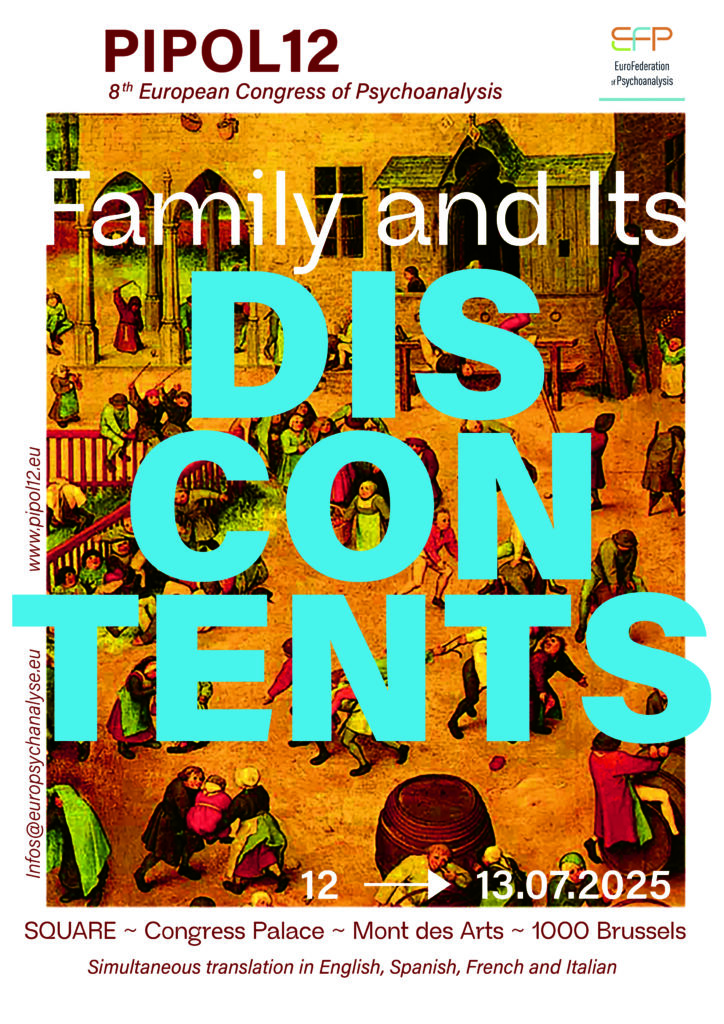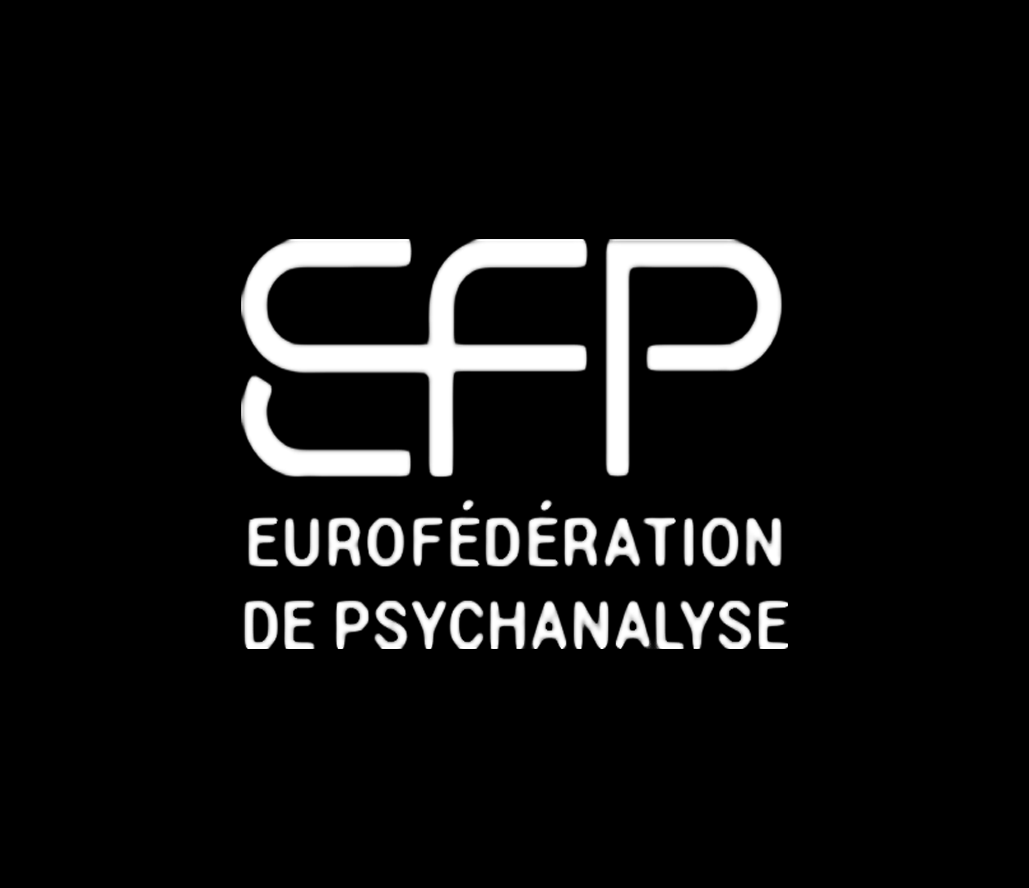 If there is one thing that shows the discontents of civilization [Malaise dans la civilisation] in our time, it is families.[1] Like the figure of the father, the family is no longer what it used to be. Though sometimes still traditional in appearance, families are now being radically reshaped and appear in a variety of forms: broken up [décomposée], reconstituted [récomposée] with children from different unions for each partner, single-parent, same-sex or even three-parent families. There is no end of invention when it comes, where necessary, to finding a makeshift way of forming a family now that the law has called into question the familial codes that had established the father as necessarily the father of all children born in wedlock. This redistribution of roles has borne primarily on the paternal representative; no doubt it was necessary to try to preserve thereby something of patriarchy, which has nevertheless held up badly under the combined blows of the discourse of science and capitalism.
If there is one thing that shows the discontents of civilization [Malaise dans la civilisation] in our time, it is families.[1] Like the figure of the father, the family is no longer what it used to be. Though sometimes still traditional in appearance, families are now being radically reshaped and appear in a variety of forms: broken up [décomposée], reconstituted [récomposée] with children from different unions for each partner, single-parent, same-sex or even three-parent families. There is no end of invention when it comes, where necessary, to finding a makeshift way of forming a family now that the law has called into question the familial codes that had established the father as necessarily the father of all children born in wedlock. This redistribution of roles has borne primarily on the paternal representative; no doubt it was necessary to try to preserve thereby something of patriarchy, which has nevertheless held up badly under the combined blows of the discourse of science and capitalism.
Family is the first human institution; it is therefore symbolic and not natural. “It is a temptation to think of family as a part of nature, since this type of bond exists among animals […][2]” If family is at the root of human institution, we can infer that it is also the starting point for all others, and particularly for care institutions. As substitutes or extensions of the family, institutions cannot do without working with families. They can distance themselves from the familial ideal by focusing on the clinic of the subject, but they cannot separate the subject from his primordial Other, the vehicle of his language [langue], whose embodiment always stems from the family, however reduced or absent it may be.
In his text “Family Affairs in the Unconscious”, Jacques-Alain Miller updates the definition of family of today. Family no longer has its starting point in marriage, rather “the family originates in misunderstanding, non-encounter, disappointment, in sexual abuse or in crime […] The family is formed by the Name-of-the-Father, by the Mother’s desire, by objects a […] The family is essentially united by a secret, it is united by something unsaid […] it is always a secret about jouissance: what do the father and mother enjoy?[3]”
Consequently, family is also the privileged place where civilisation’s discontents are expressed.[4] If family is founded to satisfy Eros, the unleashing of Thanatos, as in every human creation, attaches its yoke to it through the intermediary of the superego. In his important text on “Family Complexes”, Jacques Lacan had already announced the projected disappearance of the paternalistic family[5] and underlined that the Oedipus complex was irremediably attached to it. J.-A. Miller also points out that, as Lacan develops them, family complexes are a prefiguration of his structuralism[6]. Without the paternalistic family, the place in which the unconscious structured by the complexes is formed, we can foresee the gradual disappearance of the Oedipus complex and classical neuroses. The new definition of the unconscious put forward by Lacan in 1957,[7] “the unconscious is structured like a language”, provides a way out of the impasse of the Oedipal romance developed by Freud.
The discontents of family translate into numerous symptoms in children and adolescents: the ever-increasing recourse to psych. treatments for dysfunctions bears witness to this, as does the levels of violence and drug use prevalent among adolescents, not to mention the many complaints of sexual harassment and abuse. The other side of this classical approach will be to question the part played by today’s teenagers and children when they speak out against family structures in order to shatter them. And so, how can we grasp what place the psychoanalyst might occupy in the encounter with these young subjects and their new modes of being?
The master-signifier love holds sway over the formation and separation of couples and therefore of families, but the price of this shared freedom, which we would never dream of challenging, is a heavy one for families. There where the promise of a commitment with its moral connotations once dominated, and where, moreover, confinement within an iron order under the auspices of religious morality might have reigned, today it is the errancy of love that sweeps away couples and their progeny, prey to disputes and the division of property. Being a family today means inventing new ways of forging bonds, living together, finding makeshift solutions in a space and time that are more temporary than ever.
Also coexisting in our metropolises are families who have not experienced the effects of the transformations resulting from challenges brought by the young, campaigns for sexual equality, etc. They come from different parts of the world which operate with traditional structures, often closely linked to religious practices. In this great heterogeneity and diversity that our society has allowed to develop as a result of globalisation and openness to others, to the different Other, we find that subjects are often torn between two master discourses: that of their family; and that of the values sweeping through society, for example Woke discourse.
Today, anxiety is the prevalent symptom in family matters. It largely supersedes bodily symptoms and guilt. It leads a number of subjects to decide not to start a family, feeling powerless in the face of the future. They don’t know where to find support for the challenges our society faces in trying to regulate what human jouissance ceaselessly produces in the way of encroaching waste and outbreaks of war.
The introduction of what we might call an unlimited Other (the internet and its applications), deregulated (with its own rules and escaping the laws that struggle to contain its use) and omniscient (artificial intelligence) into the very heart of families is contributing to the disruption of bonds. Over-informed, disinformed, constantly at the mercy of news from around the world, subjects are faced with an unlimited jouissance for which they are ill-prepared. This human tool, like all human creations, carries the best and the worst and has a direct impact on Family and its Discontents.
Yet, family is also the one by one of those who constitute it – grandparents, parents, children, cousins, etc. – and what each of them brings into play – of their own neurosis or madness, which in some cases can soothe, and in others lead to the worst.
PIPOL 12 will be an opportunity to examine what this concept of family signifies today, and what it does or does not contain in the new configuration of families where the acceleration of changes in social bonds is not without manifesting itself in the demands and modalities of a clinic that is being invented and that we note in our practice.
Translation by Tracy Hoijer-Favre
Revised by Raphael Montague and Philip Dravers
[1] [T.N. Note that the French title of PIPOL12, Malaise dans la famille, evokes the French title of Freud’s Das Unbehagen in der Kultur, rendered in English as Civilisation and Its Discontents. Cf. Freud, S, The Standard Edition of the Complete Psychological Works of Sigmund Freud, Volume XXI (1927-1931), pp. 57-145.]
[2] Jacques-Alain Miller, “Affaires de famille dans l’inconscient”, in Enfants terribles et parents exaspérés, Institut psychanalytique de l’enfant du Champ freudien, Paris, Navarin éditeur, 2023, p. 161.
[3] Ibid., p. 163.
[4] Freud devotes a chapter to this in Civilisation and its Discontents. Op. cit., pp. 99-107.
[5] This is how J. Lacan describes it in his text: “Family Complexes in the Formation of the Individual”, cf. “Les complexes familiaux dans la formation de l’individu,” in Autres écrits, Seuil, 2001, p. 56.
[6] Jacques-Alain Miller, A Critical Reading of Jacques Lacan’s Les complexes familiaux, Transl. T. Svolos, Available online here: https://www.lacan.com/jamfam.htm
[7] Jacques Lacan, “The Instance of the Letter in the Unconscious or Reason Since Freud,” in Écrits, W.W. Norton & Co. London and New York, 2006. p. 412-441.
